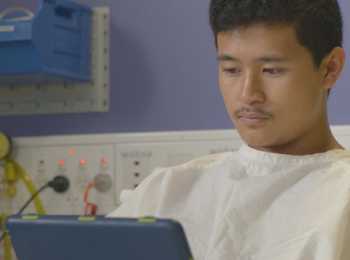Contents
Part 3
Where to get more information and help
Tips for talking
If you’re like most people, you’re not that great at knowing exactly the right thing to say at the right time.
And it can be extra hard to talk to someone who is grieving the death of a family member, even if you just want to talk about normal things.
You might worry:
“I don’t know if I should bring up what happened…or talk about anything EXCEPT that?”
“What if I say the wrong thing and upset them?”
“I don’t want to call in case I’m interrupting important family time.”
“I want to tell them about this thing that happened but my life seems so boring and unimportant compared to theirs now.”
Everyone is new at this and these kinds of thoughts are common but the trick is to not let your fear of saying the wrong thing stop you from saying anything at all. Talking can help It can be scary as anything to talk to friends about your personal thoughts and feelings. But most young people who are grieving find that it really does help to talk.
“I think that it would be good if friends asked more questions about it to show they really do care... And it gives me the opportunitiy to talk more if I want to or just give brief answers if I don’t.”

Here are some things to think about:
- Not talking about difficult stuff doesn’t make it go away. Your friend might find it a relief to get things off their chest.
- Your friend might feel isolated and alone if they can’t talk about this huge thing that is happening. They might want to bring it up but are worried that people are sick of hearing about it.
- Talking can help a person see things in a different way, or be reassured that their feelings are normal.
- Talking about and sharing what has happened can make you feel closer as friends.
“If you sound out your thoughts and problems to a friend you feel much better. No one should have to battle through anything on their own.”

What should I say?
Just relax and be yourself. It’s better to say, “I don’t know what to say” than something you don’t mean, or to avoid the situation completely.
- Just say, “How are you going?” every now and again so your friend can talk about how they are feeling if they want to (or not if they don’t).
- Your friend is not expecting you to have all the answers or to offer advice. Just let them know you care.
- You don’t have to be cheerful and positive. It’s OK to let them know you find this hard too.
- It’s OK to say the name of the person who died.
- It’s OK to say the word ‘died’.
- It’s OK for there to be silent moments. Don’t rush to fill them up.
- Sometimes your friend will just want to talk about normal things and to catch up on the goss.
- It’s never too late to acknowledge what happened. Better to say something about it late than never at all.
Remember: Sometimes your friend will want to talk about it and other times they will definitely not want to talk about it. The best plan is to follow their lead. Try not to be offended if your friend chooses not to talk, or if they open up to someone else. This doesn’t mean you have done anything wrong. They might gravitate towards people who have gone through a similar thing.
“When friends didn’t mention anything about my mum and just pretended that it hadn’t happened it made me feel angry and upset. My whole life had changed and been turned upside down and inside out, I wasn’t OK and it wasn’t OK to pretend that everything was fine.”
Tips for listening
If your friend wants to talk:
- Don’t interrupt or change the topic.
- Don’t judge or try to change their feelings. Saying things like, “Don’t talk like that” or “You should have told me” might make your friend worry that their reaction is wrong.
- Ask questions to show you’re interested.
- Be patient.
- Don’t jump in with your own experiences of illness or death.
- Keep whatever they say private (unless they ask you directly to tell someone else, or you are worried that your friend isn’t safe).
What should I not say?
Despite our best intentions, some of the things we say when we are trying to be helpful can be taken in a different way by a person who is grieving.
Best to avoid:
- “I know how you feel” – You don’t, because you’re not them. Only your friend really knows how they feel. •
- “He/she is in a better place” or “It was God’s will”– They may or may not believe that, but the only thing that matters now is that their parent or sibling is not here. •
- “You’re being so brave” – Don’t put pressure on your friend to appear strong and hide how scared they might really feel. •
- “I understand, my dog died last year” – Even if you have gone through a really similar thing, it doesn’t always help to compare. Every experience is different. •
- “Cheer up” or “He/she wouldn’t want you to cry”– This might make your friend worry that their grief is lasting too long or that their reaction is over the top.
- “Everyone dies. You have to get on with your life.” – Your friend’s life has changed forever. They are not going to get over this.
Sometimes you might make mistakes. But don’t dwell on the things you shouldn’t have said or could have done better. The biggest mistake would be to not try to talk at all.

Friendships may change
Some friendships will grow stronger through an experience like this. A lot of people say that a crisis shows you who your true friends are. But other friends will drift apart and some friendships might end.
Your friend has gone through a big lifechanging experience that will affect them in a lot of ways. They might develop a new perspective on life and think different things are important because of what happened. They may develop new friends and become more distant to their old ones.
At the same time, while your friend is dealing with their own personal grief, you will be getting on with your own life. You will also develop new interests and views as you grow up and change and you may get to a point where you realise you don’t have that much in common anymore. It can be really sad when friendships end, but it’s not necessarily anyone’s fault.
Be forgiving and remember that friends will come and go throughout your life, crisis or no crisis.
“In some ways it feels as if my friends and I have drifted apart and in some other ways it feels like we are closer than we have ever been before. My cancer journey has affected them in ways that they would never show me.”
Glossary
Benign: A tumour that is not cancer and is unlikely to spread.
Biopsy: The removal of a small piece of tissue from the body to look at under a microscope.
Cancer: A general term for over 100 diseases that have uncontrolled growth and spread of abnormal cells.
Carer: A family member or friend who looks after someone who has a chronic illness (like cancer) or disability.
Chemotherapy or ‘chemo’: The use of special drugs to treat cancer by killing cancer cells or slowing down their growth.
Chronic illness: A medical condition that is permanent or lasts for a long time.
Counsellor: A professional who is trained to give emotional and practical support to people who are going through tough times.
Diagnosis: The identification of a disease.
Malignant: A tumour that is a cancer.
Metastasis: A cancer that has spread to another part of the body. Also known as a secondary tumour or cancer.
Oncologist: A doctor who is a specialist in treating people with cancer.
Palliative care: Treatment that focuses on relieving side effects or symptoms of a disease, but will not cure it.
Prognosis: The likely outcome of a person’s disease. Cancer has a different outcome in every single case.
Psychologist: A professional who helps with emotional and mental well being.
Radiation therapy or radiotherapy: Treatment using X-rays to kill cancer cells, stop them growing or reduce pain.
Relapse: The return of signs of cancer after a period when it seemed to be gone.
Remission: When there are no signs or symptoms of active disease.
Side effects: Problems caused when cancer treatment affects healthy cells in the body.
Social worker: A professional who provides information as well as emotional and practical support for someone who is going through difficult times.
Surgery: An operation to remove or repair a part of the body.
Symptoms: Signs of an illness, such as pain, fever or nausea.
Terminal: When a disease can’t be cured.
Transplant: The replacement of tissue with tissue from the patient’s own body or from another person.
Tumour: Abnormal growth of cells that clump together and crowd out normal cells.
X-ray: A type of high-energy radiation. In low doses, X-rays are used to spot diseases by making pictures of the inside of the body. In high doses, X-rays are used to treat cancer.

Where to get more information and help
Information and support services for your friend: canteen.org.au
Canteen helps young people cope with their own cancer or cancer in their family. You can join our online community, get some answers and chat to a counsellor if you want to. You can also email [email protected] or call 1800 945 215.
youthcancer.com.au This site is especially for young people with cancer and their families. It provides information and links to services for patients throughout Australia.
cancer.org.au Cancer Council provides information and support to families dealing with cancer. Access Cancer Council in your local state from this national website.
canceraustralia.gov.au Information and resources provided by the Australian Government, including the Cancer - how are you travelling? resource.
redkite.org.au Redkite provides emotional, financial and educational help for young people (aged 0-18) with cancer and their families.
campquality.org.au Camp Quality provides free recreation programs and other support for children (aged 0-14) who have cancer and their siblings.
Useful phone numbers:
Canteen 1800 945 215
Cancer Council Helpline 13 11 20
Kids Helpline 1800 55 1800
LifeLine 13 11 14

Video
5 tips for talking to a friend or loved one who’s grieving
Our video series, ‘Supporting friends through cancer’, offers practical advice on how to support friends and loved ones who have been impacted by cancer, like this video that goes through tips for talking. Here are a few more helpful videos for when your friend or loved one is dealing with grief:
- 6 things to avoid saying to a friend or loved one who’s grieving
- 6 tips to make you a better listener
- 6 ways a friend of loved one might express their grief
- When does a grieving friend or loved one need your support the most?


















